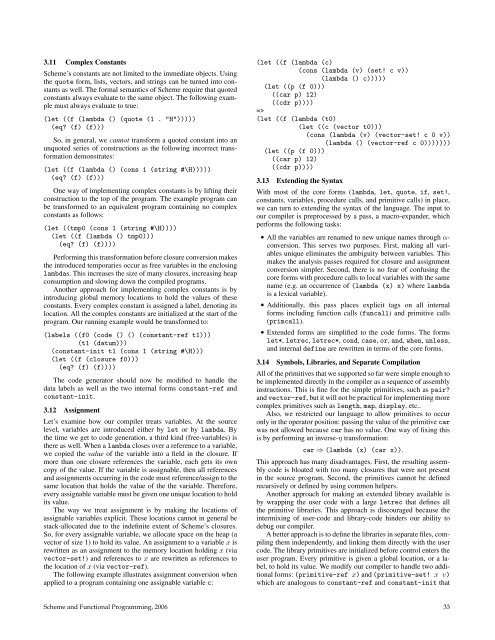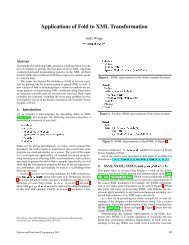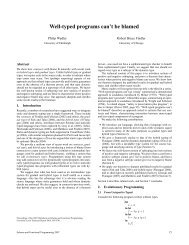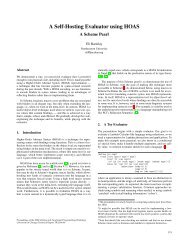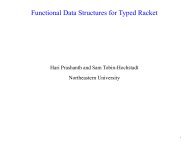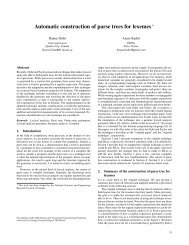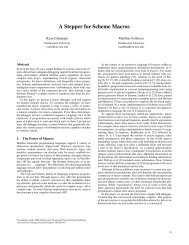2006 Scheme and Functional Programming Papers, University of
2006 Scheme and Functional Programming Papers, University of
2006 Scheme and Functional Programming Papers, University of
Create successful ePaper yourself
Turn your PDF publications into a flip-book with our unique Google optimized e-Paper software.
3.11 Complex Constants<br />
<strong>Scheme</strong>’s constants are not limited to the immediate objects. Using<br />
the quote form, lists, vectors, <strong>and</strong> strings can be turned into constants<br />
as well. The formal semantics <strong>of</strong> <strong>Scheme</strong> require that quoted<br />
constants always evaluate to the same object. The following example<br />
must always evaluate to true:<br />
(let ((f (lambda () (quote (1 . "H")))))<br />
(eq? (f) (f)))<br />
So, in general, we cannot transform a quoted constant into an<br />
unquoted series <strong>of</strong> constructions as the following incorrect transformation<br />
demonstrates:<br />
(let ((f (lambda () (cons 1 (string #\H)))))<br />
(eq? (f) (f)))<br />
One way <strong>of</strong> implementing complex constants is by lifting their<br />
construction to the top <strong>of</strong> the program. The example program can<br />
be transformed to an equivalent program containing no complex<br />
constants as follows:<br />
(let ((tmp0 (cons 1 (string #\H))))<br />
(let ((f (lambda () tmp0)))<br />
(eq? (f) (f))))<br />
Performing this transformation before closure conversion makes<br />
the introduced temporaries occur as free variables in the enclosing<br />
lambdas. This increases the size <strong>of</strong> many closures, increasing heap<br />
consumption <strong>and</strong> slowing down the compiled programs.<br />
Another approach for implementing complex constants is by<br />
introducing global memory locations to hold the values <strong>of</strong> these<br />
constants. Every complex constant is assigned a label, denoting its<br />
location. All the complex constants are initialized at the start <strong>of</strong> the<br />
program. Our running example would be transformed to:<br />
(labels ((f0 (code () () (constant-ref t1)))<br />
(t1 (datum)))<br />
(constant-init t1 (cons 1 (string #\H)))<br />
(let ((f (closure f0)))<br />
(eq? (f) (f))))<br />
The code generator should now be modified to h<strong>and</strong>le the<br />
data labels as well as the two internal forms constant-ref <strong>and</strong><br />
constant-init.<br />
3.12 Assignment<br />
Let’s examine how our compiler treats variables. At the source<br />
level, variables are introduced either by let or by lambda. By<br />
the time we get to code generation, a third kind (free-variables) is<br />
there as well. When a lambda closes over a reference to a variable,<br />
we copied the value <strong>of</strong> the variable into a field in the closure. If<br />
more than one closure references the variable, each gets its own<br />
copy <strong>of</strong> the value. If the variable is assignable, then all references<br />
<strong>and</strong> assignments occurring in the code must reference/assign to the<br />
same location that holds the value <strong>of</strong> the the variable. Therefore,<br />
every assignable variable must be given one unique location to hold<br />
its value.<br />
The way we treat assignment is by making the locations <strong>of</strong><br />
assignable variables explicit. These locations cannot in general be<br />
stack-allocated due to the indefinite extent <strong>of</strong> <strong>Scheme</strong>’s closures.<br />
So, for every assignable variable, we allocate space on the heap (a<br />
vector <strong>of</strong> size 1) to hold its value. An assignment to a variable x is<br />
rewritten as an assignment to the memory location holding x (via<br />
vector-set!) <strong>and</strong> references to x are rewritten as references to<br />
the location <strong>of</strong> x (via vector-ref).<br />
The following example illustrates assignment conversion when<br />
applied to a program containing one assignable variable c:<br />
(let ((f (lambda (c)<br />
(cons (lambda (v) (set! c v))<br />
(lambda () c)))))<br />
(let ((p (f 0)))<br />
((car p) 12)<br />
((cdr p))))<br />
=><br />
(let ((f (lambda (t0)<br />
(let ((c (vector t0)))<br />
(cons (lambda (v) (vector-set! c 0 v))<br />
(lambda () (vector-ref c 0)))))))<br />
(let ((p (f 0)))<br />
((car p) 12)<br />
((cdr p))))<br />
3.13 Extending the Syntax<br />
With most <strong>of</strong> the core forms (lambda, let, quote, if, set!,<br />
constants, variables, procedure calls, <strong>and</strong> primitive calls) in place,<br />
we can turn to extending the syntax <strong>of</strong> the language. The input to<br />
our compiler is preprocessed by a pass, a macro-exp<strong>and</strong>er, which<br />
performs the following tasks:<br />
• All the variables are renamed to new unique names through α-<br />
conversion. This serves two purposes. First, making all variables<br />
unique eliminates the ambiguity between variables. This<br />
makes the analysis passes required for closure <strong>and</strong> assignment<br />
conversion simpler. Second, there is no fear <strong>of</strong> confusing the<br />
core forms with procedure calls to local variables with the same<br />
name (e.g. an occurrence <strong>of</strong> (lambda (x) x) where lambda<br />
is a lexical variable).<br />
• Additionally, this pass places explicit tags on all internal<br />
forms including function calls (funcall) <strong>and</strong> primitive calls<br />
(primcall).<br />
• Extended forms are simplified to the code forms. The forms<br />
let*, letrec, letrec*, cond, case, or, <strong>and</strong>, when, unless,<br />
<strong>and</strong> internal define are rewritten in terms <strong>of</strong> the core forms.<br />
3.14 Symbols, Libraries, <strong>and</strong> Separate Compilation<br />
All <strong>of</strong> the primitives that we supported so far were simple enough to<br />
be implemented directly in the compiler as a sequence <strong>of</strong> assembly<br />
instructions. This is fine for the simple primitives, such as pair?<br />
<strong>and</strong> vector-ref, but it will not be practical for implementing more<br />
complex primitives such as length, map, display, etc..<br />
Also, we restricted our language to allow primitives to occur<br />
only in the operator position: passing the value <strong>of</strong> the primitive car<br />
was not allowed because car has no value. One way <strong>of</strong> fixing this<br />
is by performing an inverse-η transformation:<br />
car ⇒ (lambda (x) (car x)).<br />
This approach has many disadvantages. First, the resulting assembly<br />
code is bloated with too many closures that were not present<br />
in the source program. Second, the primitives cannot be defined<br />
recursively or defined by using common helpers.<br />
Another approach for making an extended library available is<br />
by wrapping the user code with a large letrec that defines all<br />
the primitive libraries. This approach is discouraged because the<br />
intermixing <strong>of</strong> user-code <strong>and</strong> library-code hinders our ability to<br />
debug our compiler.<br />
A better approach is to define the libraries in separate files, compiling<br />
them independently, <strong>and</strong> linking them directly with the user<br />
code. The library primitives are initialized before control enters the<br />
user program. Every primitive is given a global location, or a label,<br />
to hold its value. We modify our compiler to h<strong>and</strong>le two additional<br />
forms: (primitive-ref x) <strong>and</strong> (primitive-set! x v)<br />
which are analogous to constant-ref <strong>and</strong> constant-init that<br />
<strong>Scheme</strong> <strong>and</strong> <strong>Functional</strong> <strong>Programming</strong>, <strong>2006</strong> 33


